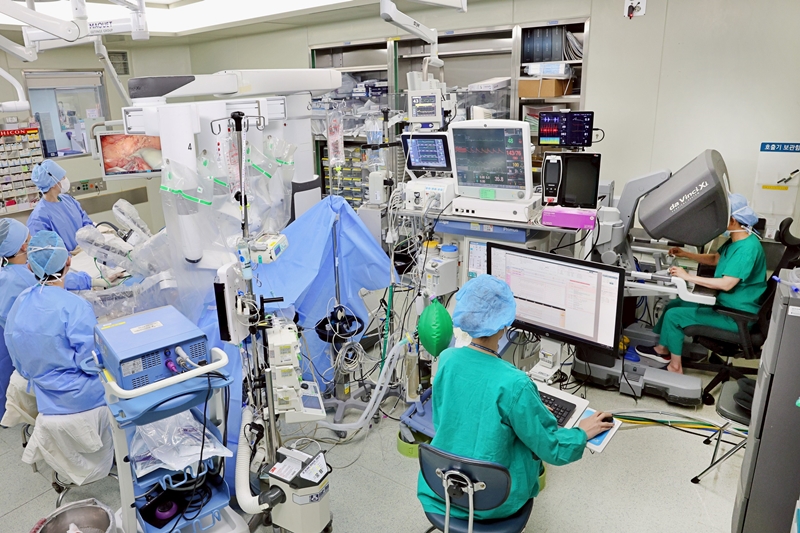-
- Global AMC MENU
- NEWS
- HEALTH
- PEOPLE
- Introduction

▲ Professor In Ja Park (far right), the Chair of the Division of Colon and Rectal Surgery (Director of the Colorectal Cancer Center) at Asan Medical Center, performs robotic surgery on a patient with rectal cancer.
The Division of Colon and Rectal Surgery at Asan Medical Center recently became the first in Korea to surpass 3,000 robotic surgeries for colorectal cancer. This milestone comes 16 years after the introduction of robotic surgery for colorectal cancer treatment in 2010.
Robotic surgery involves inserting articulated robotic arms through small incisions in the abdomen and performing surgery using high-resolution 3D imaging and a magnified, wide-angle view. This allows for precise and delicate procedures, even in narrow anatomical spaces. Robotic surgery is particularly effective for rectal cancer, which accounts for approximately 45% of all colorectal cancers and is located in the pelvis near critical organs such as the bladder and reproductive organs, making surgery highly complex. With robotic surgery, surgeons can precisely identify tissues using a magnified view of up to 15 times, and excise the cancer while minimizing damage to adjacent organs by using the robot’s articulated arms.
To date, Asan Medical Center has performed over 39,000 colorectal cancer surgeries. Among these, robotic surgeries account for over 3,000 cases, while over 13,000 were laparoscopic. With this extensive surgical experience, Asan Medical Center continues to deliver world-class outcomes. The five-year survival rates for patients who underwent rectal cancer surgery at the Division of Colon and Rectal Surgery are exceptionally high: 96.6% for stage I and 94.8% for stage II. Even for stage III, which involves more complex procedures, the five-year survival rate improved from 83.1% in 2015 to 91.3% in 2017—an 8.2 percentage point increase. The rate of severe complications within 30 days after surgery remains very low at around 3%, including challenging cases such as recurrent colorectal cancer, cancers with metastases to other organs, and simultaneous surgeries.
Recently, Asan Medical Center has been actively utilizing robotic surgery for highly complex procedures such as single-port surgeries, which treat colorectal cancer through a single incision and surgeries for patients with colorectal cancer and liver metastases. In addition, to improve patients’ quality of life, more than 90% of rectal cancer surgeries are performed as sphincter-preserving procedures. Efforts are made to retain the anal sphincter as much as possible to enable normal bowel function after surgery.
Professor In Ja Park, Chair of the Division of Colon and Rectal Surgery (Director of the Colorectal Cancer Center), stated, “We were able to achieve 3,000 robotic surgeries for colorectal cancer as a result of the extensive surgical experience gained from treating the largest number of colorectal cancer patients in South Korea, along with our continued efforts to improve patients’ quality of life. We will continue to lead the way in robotic surgery as well as in the treatment of advanced and technically demanding colorectal cancers.”












